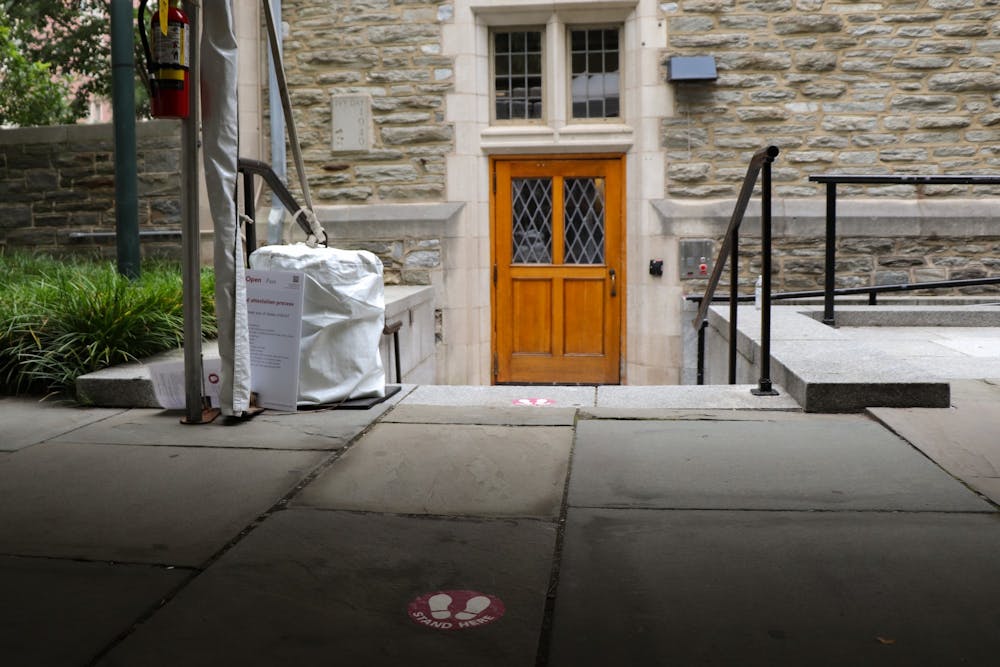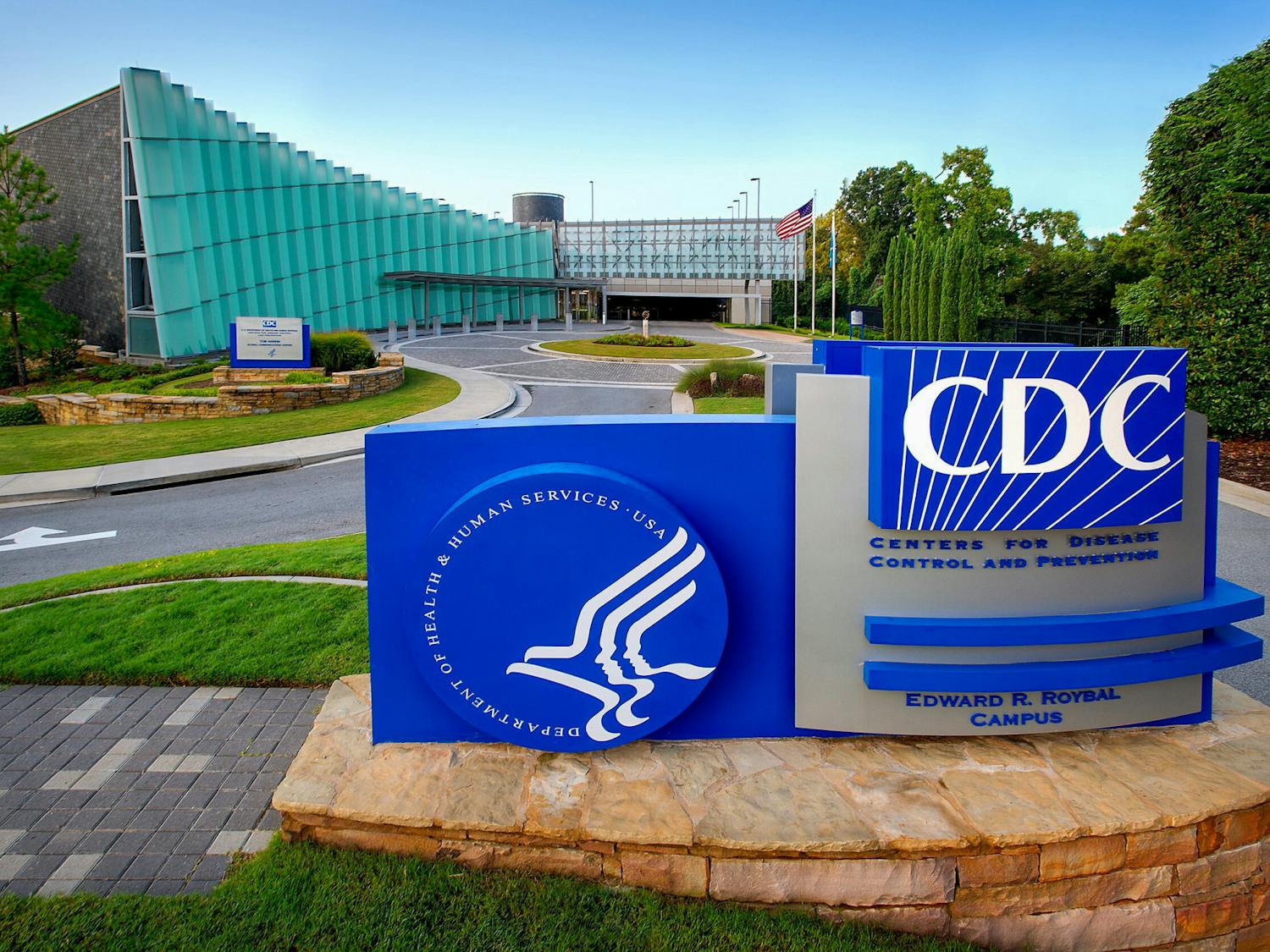As COVID-19 cases rise in Philadelphia and as the spring semester looms closer, students living in dorms are worried about enforcing testing on campus.
Penn is currently offering weekly COVID-19 testing that is mandatory for students, faculty, post-doctoral trainees, and staff that are living in on-campus housing or are on campus for “at least eight hours every week and whose activities are done in a congregate setting that involves at least 10 people.” This testing is recommended, but not mandatory, for students living off campus who have more than three roommates.
Despite Penn's mandatory testing for those living in dorms, Rodin College House graduate assistant Brinna Ludwig said this testing isn’t enforced well, and she is especially uneasy because she has mandatory contact with other students in her role as a GA, where she must remind students living in dorms to social distance and wear their masks in public indoor areas, like the lounge.
Ludwig, who is a second-year law student at Penn Law School, said she is required to get tested weekly not only because she lives in the dorms as a GA, but because she attends in-person classes at Penn Law. On Sept. 18, she reached out to Felicia Lin, the Dean of Students at Penn Law, to see what the enforcement policy was regarding weekly testing.
Ten days after her email, Ludwig said Lin emailed Penn Law students to explain that Penn Law will begin to tie compliance with the testing policy with PennCard access to the Law School.
Lin wrote that “students who have not taken a test the week prior will not be granted PennCard access to the Law campus, and will need to attend classes remotely until they take their test.” The email also said that students must be tested by Friday at noon every week in order to have access to the Law School the next week.

On Oct. 5, this policy was further updated to require students be tested by the end of Thursday each week in order to “help ensure that the system has sufficient time to link your PennCard to your test compliance for the subsequent week.”
RELATED:
Van Pelt reopens with limited hours to students living in on-campus housing
Concerned about COVID-19, only 6% of RAGAs participate in pilot indoor dining program
Ludwig said that this enforcement “piqued [her] interest since it seemed like there was no type of equivalent compliance policy for residents and staff on campus."
“Obviously, you can't not let someone into their dorm if they don't get tested in the same way you can restrict access to the law school building, and I'm in no way expecting that, but there didn't seem to be any type of enforcement mechanism,” she continued.
Chief Wellness Officer Benoit Dubé said that there has been “a sustained, continued effort that has been overwhelmingly positive” in regards to regular COVID-19 testing, and that there is a “stepwise approach” that gets more drastic as time passes to enforce testing for those for whom testing is mandatory.
According to Dubé, the first week students, faculty, or staff who live on or frequent campus fail to get tested they will simply receive an email encouraging them to get tested this upcoming week. Then, if they still do not get tested the next week, they receive a phone call reminding them to get tested. Finally, if they do not get tested for a third consecutive week, they are referred to the Office of Student Conduct.
The Student Campus Compact, that all students had to agree to before returning to campus, says that failure to follow the compact can result in “disciplinary review and action” from OSC, although the University has not released more specifics on what this disciplinary action entails.
This process does not apply to students who are living off campus, as they are not required to get tested regularly. However, those students are still eligible for weekly COVID-19 testing.
“The compromise for us is, well, we know that you’re still here, so why don’t you come get tested. That’s why we laid out the invitation [to get tested] to students and we targeted those who lived in the 19104 zip code as their learning from address,” Dubé said. “We can’t force anyone, but we encourage people to do so, and there was enthusiastic buy-in from the community.”
Despite this process being in place, first-year Ph.D. student in the Graduate School of Education and Rodin GA Claire Wan said that she has never heard of it enforced.
“There was actually one period of time where I didn't get tested for over a week because of my scheduling, and I got tested the following week, and I did not get an email or a notification," she said. "Perhaps I slipped through the cracks but I haven't received anything."
Wan said she's spoken with her RAGA peers, many of whom are also worried, but feel the only thing they can do is hope that residents are following the rules and getting tested.
"I've brought this up with other RAGAs as well, and everyone is like 'Well, we can just hope that the residents and everyone is getting tested,' but I'm not sure about who receives the communication, because I certainly have not."
A Nursing senior and Riepe College House residential advisor, who requested anonymity because she feared repercussions from College Houses and Academic Services, said she had never heard of the enforcement process. She has also once missed getting a COVID-19 test one week and has not received any email telling her she must be tested. She is currently living in Harnwell College House since RAGAs living in first-year college houses were relocated to one of the houses currently being occupied.

One College junior who is a Rodin RA, and who also requested anonymity for fear of backlash from her CHAS employer, also expressed concerns about PennOpen Pass, an online platform that students living on-campus must use to self-report any symptoms they have every day in order to have access to buildings on campus. They must receive a green pass to enter on-campus buildings.
“I think PennOpen Pass is a joke,” she said. “You don't get your temperature tested. I know people who've lied on it before. I actually know someone who was positive and lied on it,” she said.
Ludwig, who has also never received an email nor heard of anyone receiving an email after not getting tested one week, expressed concerns about how long the enforcement process theoretically is.
“If someone isn't getting tested on a weekly basis, it can't be a four-week process of enforcement because that's four weeks potentially that person isn't getting tested and putting everybody else at risk,” she said.
She also stressed concerns for her personal safety as a GA on campus tasked with enforcing the Student Campus Compact.
“I'm being asked to be on duty now. I'm being asked to make rounds and being asked to go up to students who aren't wearing masks and to ask them to wear their masks when they're in public spaces like the rooftop lounge in Rodin. I should be able to do that knowing that there's a compliance and enforcement policy for testing and consequences if someone doesn't get tested,” she said.
According to Dubé, a “majority of students” living on campus are following public health guidance and are getting tested regularly, and he attributes this to the reason why there has been no large outbreak of COVID-19 on campus thus far.
“If it were not for student buy-in and eagerness to do the right thing to keep all of our community safe, then we would have other problems on our hands, like unmanageable outbreaks,” he said. “We're very privileged that [a large outbreak] has not happened to us, and I think that that is a testimony to students being responsible and taking this seriously, making the right decisions and looking out for all of their communities, not just their household, but their neighborhoods, the campus, the businesses they interact with."
The most recent data for the number of COVID-19 tests and cases on campus is from the week of Oct. 18, where there were 4,059 total tests, with 53 positive cases — a 1.31% positivity rate.
Ludwig, however, thinks the only reason there has not yet been an outbreak on Penn’s campus is that there is a drastically smaller number of students than usual living on campus right now. She speculates an outbreak would be certain if more students returned to campus in the spring.
“The concern is that they will use the fact that there hasn’t been an outbreak to bring back all students in the spring. And while it would be great if the risk was such that we could bring back all students in the spring, the reality is that their policies for testing are not the reason there hasn’t been an outbreak," she said. “There hasn’t been an outbreak because there are only 300 students living on campus.”
Wan agrees — she isn't sure that testing is the reason why there hasn't been an outbreak of COVID-19 on campus.
"I would say the reason that positive cases have been so low is that you know folks are sort of self-regulating that way," she said. "I don't necessarily think that translates to the frequency of testing."
Dubé, on the other hand, did say that if students are welcomed back to campus in the spring, there will be a system similar to the one Penn Law uses to enforce testing.
“The rules will not be you should give this a try, but rather the rules would likely become if you want to have access to campus you must be enrolled,” he said.









